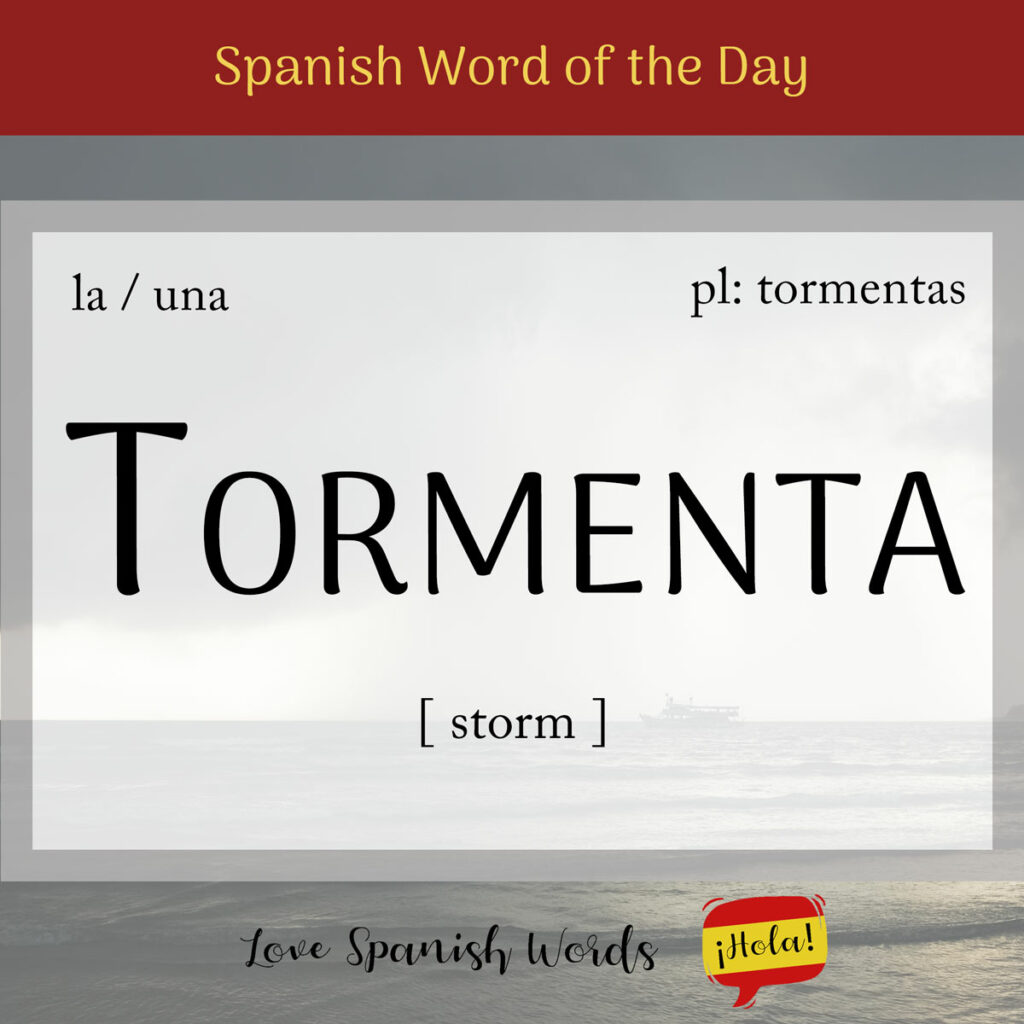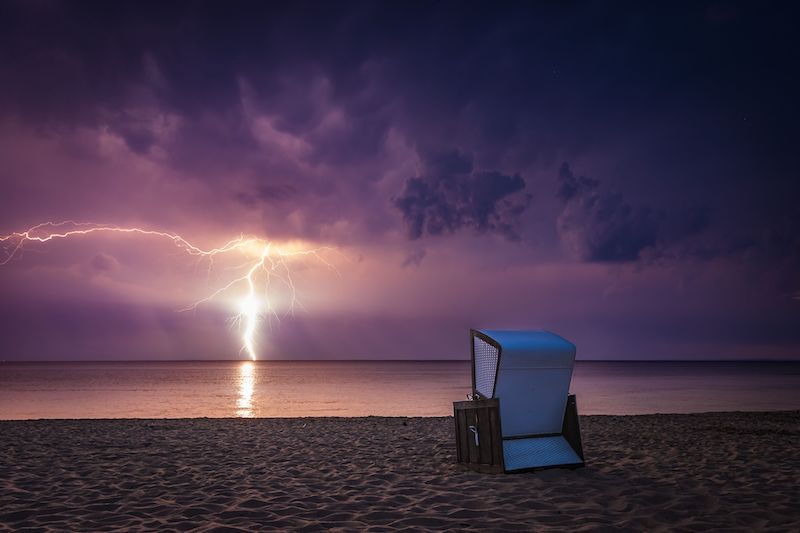The word tormenta (storm / thunderstorm) originates from the Latin word turbo, meaning swirl or whirlwind. The suffix -menta is often used to form nouns that denote an action or a state of being.
In the word tormenta, the whirlwind is in action, causing various types of precipitation such as rain, snow, and hail. It can also result in strong winds or electrical activity, like thunder and lightning.
Latin American Pronunciation
European Pronunciation

The word tormenta is a feminine noun and takes the following definite and indefinite articles.
- la tormenta = the storm
- las tormentas = the storms
- una tormenta = a storm
- unas tormentas = some storms
La tormenta de anoche derribó varios árboles en mi barrio.
Last night’s storm knocked down several trees in my neighborhood.
There are many types of tormentas. Below are a few.
- tormenta eléctrica = electric storm / thunderstorm
- tormenta tropical = tropical storm
- tormenta de granizo = hailstorm
- tormenta de nieve = snowstorm
- tormenta de arena = sandstorm
- tormenta de polvo = duststorm
Tormentas can have an impact on the medio ambiente (environment). Some types will cause inundaciones (flooding), erosión (erosion), and habitat destruction. They can also have a social impact such as apagones/cortes de electricidad (power outages), daños de propiedad (property damage), and disruptions in daily life. Depending on their intensity, they can have a profound impacto económico (economic impact) and affect comunidades (communities). Let’s look at a few types of tormentas.
Some of the most notable tormentas around the world are huracanes (hurricanes) which mainly affect the North Atlantic Oceans, North Eastern Pacific Oceans, and the Caribbean Islands. The countries most affected by hurricanes include the United States, Mexico, and Cuba.
Tifones (typhoons) are the same type of tormenta as hurricanes, but the term is used when it affects East Asia and the Northwestern Pacific Ocean. The countries most affected by typhoons are Japan, the Philippines, China, and Vietnam.
Ciclón tropical (tropical cyclones) is the term given to these types of tormentas that affect the Indian Ocean and South Pacific Ocean. Countries most affected by ciclones are Australia and Madagascar.
La tormenta tropical se convirtió en huracán categoría 3.
The tropical storm became a Category 3 Hurricane.
Another strong tormenta that causes a lot of damage is a tornado (tornado). Sometimes tornados are referred to as twisters in English. They mainly happen in the United States, specifically in an area known as corredor de los tornados (tornado alley). However, they can occur in other parts of the country, as well as in Canada.
Another common tormenta is a tormenta de polvo (duststorm), also known as a tormenta de arena (sandstorm). They affect many arid and semi-arid regions such as the Middle East and North Africa. They specifically happen in el desierto del Sahara (Sahara Desert). Furthermore, they can be seen in:
- Asia Central = Central Asia: Iran and Afghanistan
- Este de Asia = East Asia: Gobi Desert
- Suroeste de américa del norte = southwest of North America
- Norte de México = northern Mexico
- Sudamerica = South America: Patagonia Desert in Argentina.
- Australia = Australia: Simpson Desert and the Outback.
The last tormenta we will mention is tormentas de nieve (snowstorms). These tormentas occur all over the world where cold conditions are common. They happen in:
- Canadá = Canada
- Noreste de Estados Enidos = north-eastern United States
- Norte de Europa = northern Europe: Scandinavian countries
- Norte de Asia = North Asia: Russia, Japan, and China.
- Antártida = Antarctica
- Alpes del sur en Nueva Zelanda = southern Alps in New Zealand
- Sur de los Andes = southern Andes: Patagonia in Argentina and Chile
- Partes del sur de Australia = southern parts of Australia
The word tormenta is often used metaphorically to describe difficult situations a person goes through emotionally. It also symbolizes and represents conflicto (conflict), cambios drásticos (drastic changes), and caos (chaos).
Many expressions use this metaphor. A popular one is la calma antes de la tormenta, which translates to “the calm before the storm” in English. It refers to a period of tranquilidad (tranquility) or paz (peace) before trouble or chaos begins. It can also describe the period before a challenging time in life starts.
Another popular expression is la tormenta perfecta, which translates to “the perfect storm” in English. This metaphor describes a situation where various factors or events come together to create a significant impact or outcome, often an unexpected one. It is used to discuss desastres naturales (natural disasters), cuestiones sociales (societal issues), asuntos personales (personal issues), or other situations.
Una tormenta de ideas is another popular expression. It means a storm of ideas. This phrase describes a proceso creativo (creative process), usually collaborative, where many ideas are gathered in a short period of time.
Este año ha sido una tormenta emocional para ella porque pasó por un divorcio, una pérdida de trabajo y la muerte de un ser querido.
This year has been an emotional storm for her as she went through a divorce, a job loss, and the death of a loved one.

Spanish idioms featuring ‘tormenta’
Estar en el ojo de la tormenta
Literal translation: to be in the eye of the storm
English meaning: to be in the center of a problematic situation or conflict
Hacer una tormenta en un vaso de agua
Literal translation: to create a storm in a cup of water
English meaning: to exaggerate a minor problem / make a small situation appear bigger than it is
Enfrentar la tormenta
Literal translation: to face the storm
English meaning: to face a difficult situation or challenge with courage
Pasar la tormenta
Literal translation: to get through/pass the storm
English meaning: to wait until a period of difficulty passes (can be used literally or metaphorically)

